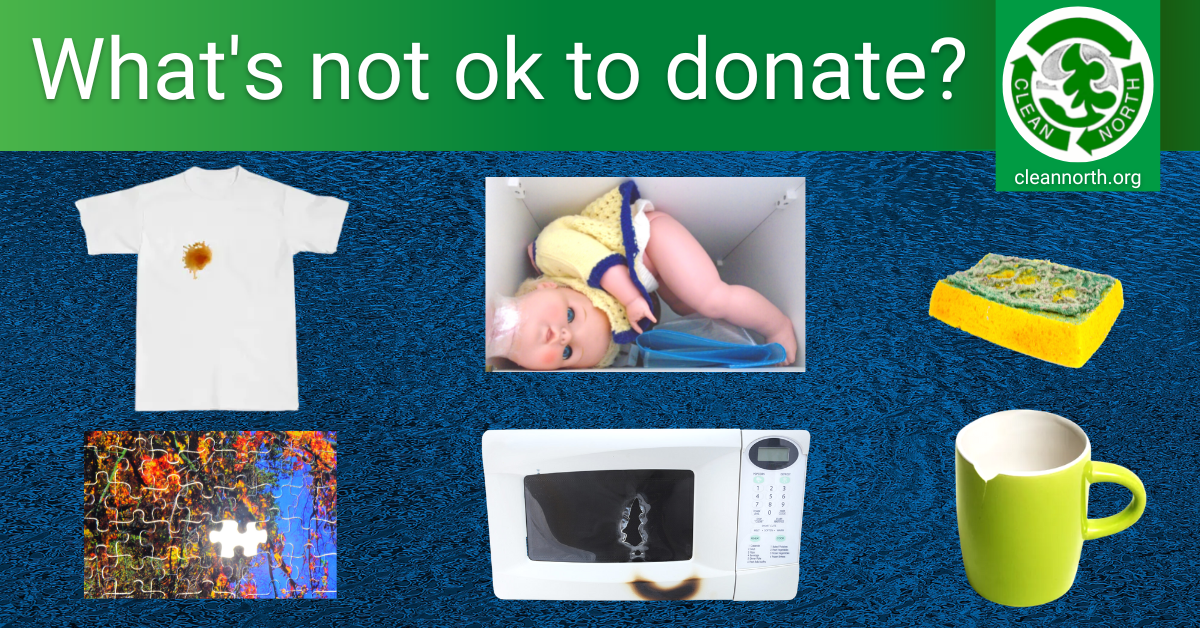
When a charity or thrift store gets saddled with stuff that can’t be sold, that can be a major burden for them. It costs time, effort, and money to sort through and dispose of un-sellable junk. And they rarely have the resources to fix or wash items. So be cautious about what you donate.
“What should I ask myself before I donate?”
- Does your stuff work the way it’s supposed to, or does it need repair? Most charities/thrift stores do not have the resources to repair items.
- Is it clean? They also usually do not have the resources to wash items.
- Is it damaged? Stains, tears, scratches, cracks, or large chips are all problematic, but degree of damage matters. One tiny stain on a pair of jeans is not a big deal; huge rips in the knees is.
- Does it smell? Some odours like musty basement smell, cigarette smoke, or perfume are difficult to remove from fabrics and household items. It can take 3+ washings to remove perfume from a garment. Either wash it till it’s odour-free or don’t donate it.
- Have any recalls or safety alerts been issued? If so, the item not suitable for donating.
- Would YOU buy this item in its current condition? If not, give it to someone who might be able to repurpose it or throw it away.
“What are some examples of what not to donate?”
- Furniture with major damage, for example, a missing leg or a deep gouge (minor scratches are usually ok)
- Items that can harbour bed bugs such as mattresses, box springs, sofa beds, pillows, stuffed animals (phone first; some places will accept such items, others won’t)
- Appliances/electronic items that don’t work (important exception: Habitat for Humanity Re-Store accepts broken appliances as well as scrap metal; the City of Sault Ste. Marie Hazardous Waste Depot, Re-Store, Staples, and Best Buy take broken electronics)
- Baby items like cribs, car seats, strollers as well as crutches, walkers, commodes, and other medical equipment (they may not meet safety standards or even be illegal to re-sell; phone first to see if accepted)
- Items that are dirty, stained, ripped, smelly, or covered in pet hair
- Chipped/cracked dishes and glassware
- Chipped/scratched non-stick cookware
- Games and puzzles with missing pieces
- Broken toys
- Opened personal care products (some places may not accept unopened ones either)
- Propane tanks, barbecues or anything that could contain hazardous materials (insecticides, herbicides, solvents, etc.)
- Weapons
- Stuff nobody wants anymore especially in large quantities (for example: plastic binders, CD cases, VCR tapes)
“So what do charities and thrift stores really want?”
- Clean clothing and furniture, small appliances, and housewares in good condition always sell well.
- Books, jewellery, antique/collectible items, and unique items (for example, a funny dog sweater or a lava lamp) are often quickly snapped up, too.
Again…make sure anything you donate is clean, in good condition, and functional.
Box up donations with care!
- Do not hide a sharp object like a knife inside clothing or towels. Wrap it well in paper, put tape around it, and mark what it is.
- Wrap fragile items in paper or plastic bags and mark Fragile.
- Toss in any clean extra bags or packing paper you have around the house. Charities and thrift shops can always use more of those.
- If you are donating a lot of clothing at once, consider sorting and bagging by gender/age (men, women, children) and type (outerwear, pants, tops, shorts, etc.). Fold items neatly. Doing so will saves staff time in seeing what’s there and organizing for sale.
- Please do not drop off outside regular donation hours. Passersby may rifle through the bags/boxes, creating a huge mess that staff then have to clean up.
“But what can I do with stuff I can’t bring myself to toss?”
Try giving it away on Facebook to someone who might be able to repair/reuse/upcycle. For example:
- Someone might take a table missing a leg, put a new leg on, and put it in their camp.
- Unwearable clothing can be made into rag rugs.
- Old cribs can be made into benches.
- Broken dishes can be used in mosaic art.
- Scrabble tiles can be used in craft projects or to replace missing pieces.
- Old blankets, towels, and pet beds can go to the Humane Society.
- And again, broken electronics can go to Habitat for Humanity Re-Store, Best Buy, or Staples. Re-Store also takes broken appliances.
Visit our Where to Recycle/Donate page for a full list of places that accept donations of all sorts of items. Phone first to confirm the charity or thrift shop you have in mind will take your items.
Good luck decluttering!
And thank you for helping to reduce pressure on our landfill in a responsible way through ethical donating.
Got questions?
Email us at info@cleannorth.org.




